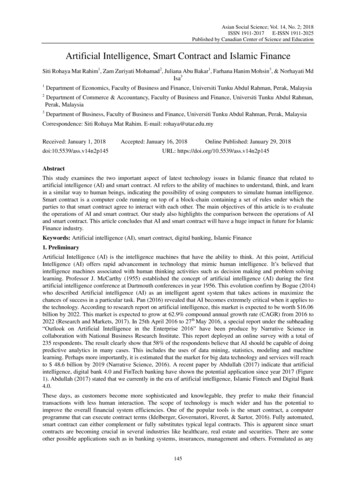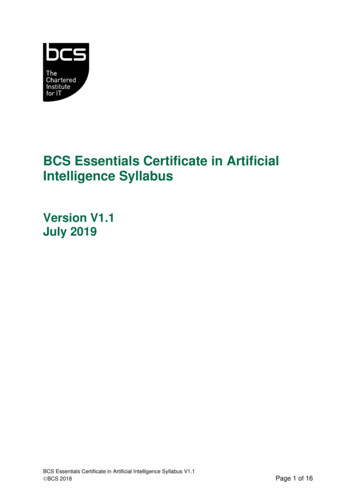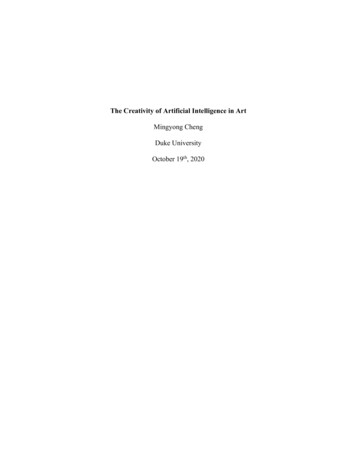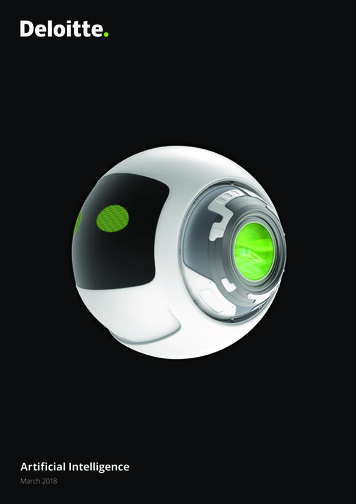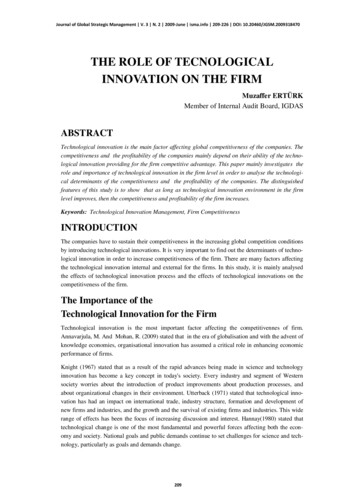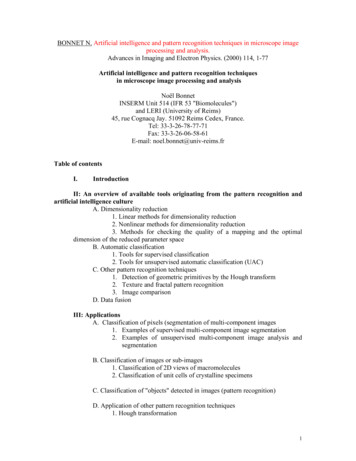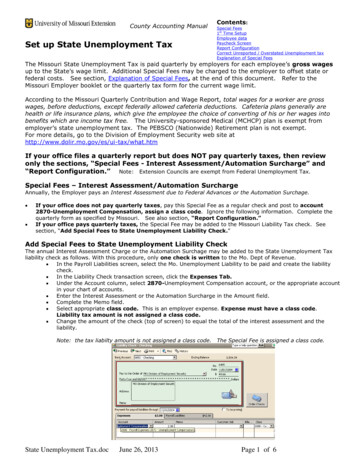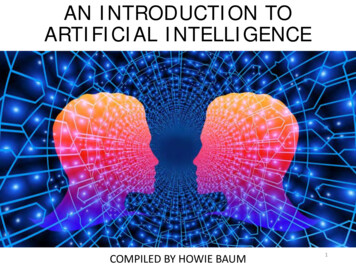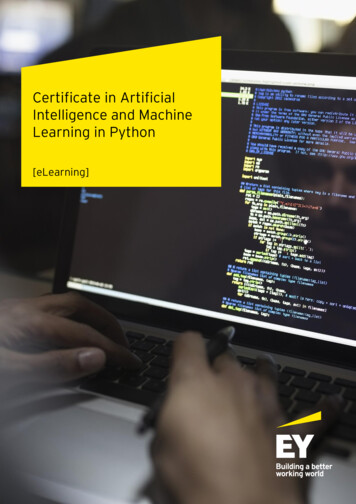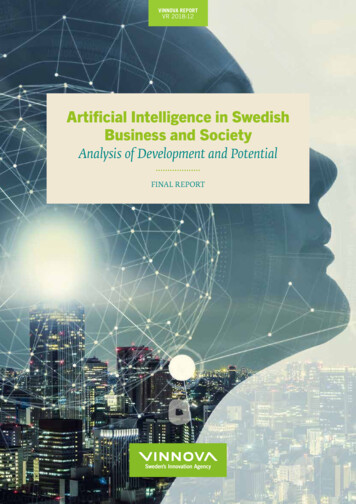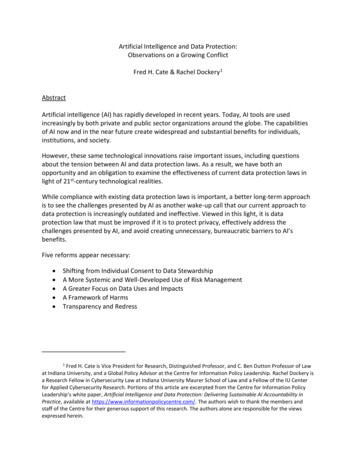
Transcription
Artificial IntelligenceandTechnological UnemploymentMoshe Y. VardiRice UniversityHouston, TX, USAvardi@cs.rice.eduFollow me on social media!
Where Are The Jobs?
How a New Jobless Era Will Transform AmericaDon Peck: “The Great Recession may be over,but this era of high joblessness is probably justbeginning. Before it ends, it will likely changethe life course and character of a generation ofyoung adults. It will leave an indelible imprint onmany blue-collar men. It could cripple marriageas an institution in many communities. It mayalready be plunging many inner cities into adespair not seen for decades. Ultimately, it islikely to warp our politics, our culture, and thecharacter of our society for years to come.”
Earning and Marriage
US Birthrate (Births/1000)2.3M fewer births!
The Great Coupling
The Great Decoupling
US GDP per Capita and House Income
A rising tide lifts all boats? Harold Meyerson: “Tide and boats have partedcompany!”
The Neoluddites E. Brynjolfsson and A. McAfee: “Productivitygrowth and employment growth started tobecome decoupled from each other. We arecreating jobs, but not enough of them.J. Sachs and L. Kotlikoff: “What if machinesare getting so smart, thanks to theirmicroprocessor brains, that they no longerneed unskilled labor to operate?“P. Krugman: “Can innovation and progress reallyhurt large numbers of workers, maybe evenworkers in general? The truth is that it can,and serious economists have been aware ofthis possibility for almost two centuries.”
The Neclassicals K. Rogoff: “Since the dawn of the industrialage, a recurrent fear has been thattechnological change will spawn massunemployment. Neoclassical economistspredicted that this would not happen, becausepeople would find other jobs, albeit possiblyafter a long period of painful adjustment. Byand large, that prediction has proven to becorrect.”
The Debate in A Nutshell Neoluddites: “This time it is different.” Neoclassicals: “This time it is not different.”Who is right?Let’s go back to basics!
Birth of Intelligent Machines “Logic Piano”, built byWilliam S. Jeavons,1869
Birth of Artificial Intelligence, I William S. Jeavons: “The machine representsa mind endowed with powers of thought, butwholly devoid of knowledge. . It cannot beasserted indeed that the machine entirelysupersedes the agency of conscious thought.”
Birth of Artificial Intelligence, II Charles S. Peirce, 1887: "Precisely how muchthe business of thinking a machine couldpossibly be made to perform, and what part ofit must be left to the living mind is a questionnot without conceivable practical importance."
Birth of Artificial Intelligence, III Alan M. Turing, 1902-1954
“Computing Machinery and Intelligence” Turing, 1950:“ I believe that at the end of the century theuse of words and general educated opinion willhave altered so much that one will be able tospeak of machines thinking without expecting tobe contradicted.”Crux of paper: A compelling philosophicalanalysis for the feasibility of intelligentmachines.
Objections to Machine Intelligence1.Theological objection2.Consequentialist objection3.Mathematical objection4.Consciousness objection5.Inability objection6.Originality objection7.Continuity objection8.Informality objection9.ESP objection
AI: Early Optimism 1958, H. A. Simon and A. Newell: "within tenyears a digital computer will be the world'schess champion”1967, M. Minsky: "Within a generation . theproblem of creating 'artificial intelligence' willsubstantially be solved."
“AI Winters” The first AI winter 1974 1980: slow progressand dearth of funding The second AI winter 1987 1993: the “FifthGeneration bust” and dearth of funding
AI Breakthroughs, I 1997: IBM’s Deep Blue beats Kasparov.
AI Breakthroughs, II 2005: DARPA Grand Challenge - Stanfordautonomous vehicle drives 131 miles along anunrehearsed desert trail.
AI Breakthroughs, III 2007: DARPA Urban Challenge - CMUautonomous vehicle drives 55 miles in an urbanenvironment while adhering to traffic hazardsand traffic laws.
AI Breakthroughs, IV 2011: IBM’s Watson defeats the two greatestJeopardy! champions, Brad Rutter and KenJennings, by a significant margin.
AI Breakthroughs, VBigDog is a dynamically stable quaruped robotcreated in 2005 by Boston Dynamics.
AI Breakthroughs, VI Google driverless car
AI Breakthroughs, VII Warehouse robots
The Prospects of Intelligent MachinesProspects seem quite very good! AI has been making inexorable progress Turing’s analysis is still compelling We have an existence proof – us!
The Robots Are Coming 2011: “New UCSF Robotic Pharmacy Aims toImprove Patient Safety” 2011: “Japanese Robot Debones 1,500Chickens Per Hour” 2012: “Meet South Korea’s New RoboticsPrison Guards” 2013: “New Sedation Machine PromisesCheaper Colonoscopies; Doctors Fight Back” 2014: “Royal Caribbean's Quantum of theSeas Features a Bionic Bar with RobotBartenders”
Fear of “Thinking Machines”
Impact on Jobs 2009, M. Ford, Lights in The Tunnel:“Is it possible that accelerating computertechnology was a primary cause of the currentglobal economic crisis—and that even moredisruptive impacts lie ahead?” 2012, E. Brynjolfsson and A. McAfee, RaceAgainst The Machine:““Technological progress is acceleratinginnovation even as it leaves many types ofworkers behind”
Man vs Machine
Technological Unemployment J.M. Keynes, 1930: Economic Possibilities forour Grandchildren “We are being afflicted with a new disease ofwhich some readers may not yet have heard thename, but of which they will hear a great dealin the years to come – namely, technologicalunemployment. This means unemployment dueto our discovery of means of economizing theuse of labor outrunning the pace at which wecan find new uses for labor.”
Productivity and Unemployment A. Tabbarok, 2013: “I am growing increasinglyannoyed with people who argue that the darkside of productivity growth is unemployment. The “dark side” of productivity is merelyanother form of the Luddite Fallacy – the ideathat new technology destroys jobs. If theLuddite fallacy were true we would all be out ofwork because productivity has been increasingfor two centuries.
The Luddites, I The original Luddites were hosiery and laceworkers in Nottingham, England in 1811. Theysmashed knitting machines that embodied newlabor-saving technology as a protest againstunemployment, publicizing their actions incirculars mysteriously signed, "King Ludd".**In 1779, Ned Ludd is supposed to have broken twostocking frames in a fit of rage.
The Luddites, IIJohn Kay fleeing a mob intent on destroying hismechanical loom
Historical GDP Growth
The Luddites, III R. Bray: Luddite Spring — The HuddersfieldLuddite Uprising “All available Luddite literature, usually in theform of popular songs, protest songs, andbroadsheets, shows that unemployment,poverty, and starvation were their majorconcerns.”
Historical Income-Proxy Data, I
Historical Income-Proxy Data, II
Communist Manifesto, 1848 K. Marx and F. Engels: “Constantrevolutionising of production, uninterrupteddisturbance of all social conditions, everlastinguncertainty and agitation distinguish thebourgeois epoch from all earlier ones. Allfixed, fast-frozen relations are swept away,all new-formed ones become antiquatedbefore they can ossify. All that is solid meltsinto air, all that is holy is profaned, and man isat last compelled to face with sober senses hisreal conditions of life, and his relations withhis kind.”
Communist Revolutions Soviet Revolution, 1917 Estimate: Stalin killed 25M peopleChinese Revolution, 1949 Estimate: Mao killed 50M people
The Paris Commune May 1871: Massacres in Paris as army takescontrol – 10,000 killed (estimate)
Evolution of Labor Laws Eliminate power to order corporal punishment,and hard labor for breach of labor contracts Eliminate right to enforce labor contracts Regulation of child labor Health and safety laws Regulation of working hours Allowing unionizationBottom Line: Society responded to the newindustrial reality.
Neo-Luddism, I The Economist, 2011: Difference Engine-Luddite Legacy An apocryphal tale is told about Henry Ford IIshowing Walter Reuther, the veteran leader ofthe United Automobile Workers, around a newlyautomated car plant. “Walter, how are you goingto get those robots to pay your union dues?”,gibed the boss of Ford Motor Company.Without skipping a beat, Reuther replied,“Henry, how are you going to get them to buyyour cars?”
Neo-Luddism, II N. Wiener, 1949:To: Walter Reuther, UAW“I am Professor of Mathematics at theMassachusetts Institute of Technology, and Iam the author of the recently published book,Cybernetics. I have been interested for a longtime in the problem of automatic machinery andits social consequences. These consequencesseem to me so great that I have made repeatedattempts to get in touch with the Labor Unionmovement, and to try to acquaint them withwhat may be expected of automatic machinery inthe near future.”
“Disastrous Unemployment” N. Wiener, 1949:“This apparatus is extremely flexible, andsusceptible to mass production, and willundoubtedly lead to the factory withoutemployees; as for example, the automaticautomobile assembly line. In the hands of thepresent industrial set-up, the unemploymentproduced by such plants can only be erreuther
Why Socialism? A. Einstein, 1949:“Technological progress frequently results inmore unemployment rather than in an easing ofthe burden of work for all. . The result ofthese developments is an oligarchy of privatecapital, the enormous power of which cannot beeffectively checked even by a democraticallyorganized political socialism/
“The Triple Revolution”, I “Cybernation, Weaponry, Human Rights” An open memorandum sent to U.S. PresidentLyndon B. Johnson March 22, 1964.Drafted under the auspices of the Center forthe Study of Democratic Institutions,Signed by an array of noted social activists,professors, and technologists who identifiedthemselves as the Ad Hoc Committee on theTriple Cfiles/C CC2a TripleRevolution.htm
“The Triple Revolution”, II The Cybernation Revolution: “A new era ofproduction has begun. Its principles oforganization are as different from those ofthe industrial era as those of the industrialera were different from the agricultural. Thecybernation revolution has been brought aboutby the combination of the computer and theautomated self-regulating machine. Thisresults in a system of almost unlimitedproductive capacity which requiresprogressively less human labor.”
“The Triple Revolution”, III “The fundamental problem posed by thecybernation revolution in the U.S. is that itinvalidates the general mechanism so faremployed to undergird people’s rights asconsumers. Up to this time economic resourceshave been distributed on the basis ofcontributions to production, with machines andmen competing for employment on somewhatequal terms. In the developing cybernatedsystem, potentially unlimited output can beachieved by systems of machines which willrequire little cooperation from human beings.”
“The Brain Center at Whipples” Episode 153 of the American television seriesThe Twilight Zone, aired on May 15, 1964 onCBS. In 1967, Wallace V. Whipple, owner of a vastmanufacturing corporation, installs the"X109B14 modified transistorized totallyautomated machine," which leads to layoffs.Eventually, he is replaced by a robot."It isn't fair, Hanley! It isn't fair the waythey.diminish us.“https://www.youtube.com/watch?v 7jsQoyfO7Uw
Pessimism Refuted, I
Pessimism Refuted, II
“The End of Work” J. Rifkin, 1995: Worldwide unemploymentwould increase as information technologyeliminated tens of millions of jobs in themanufacturing, agricultural and servicesectors. There will be devastating impact ofautomation on blue-collar, retail and wholesaleemployees. While a small elite of corporatemanagers and knowledge workers would reapthe benefits of the high-tech world economy,the American middle class would continue toshrink and the workplace become ever morestressful.
The Dot.Com Boom: NASDAQ
Luddism Redux W.H. Davidow and M.S. Malone, HBR, 2014:What Happens to Society When RobotsReplace Workers? “The technologies of the past, by replacinghuman muscle, increased the value of humaneffort – and in the process drove rapideconomic progress. Those of the future, bysubstituting for man’s senses and brain, willaccelerate that process – but at the risk ofcreating millions of citizens who are simplyunable to contribute economically, and withgreater damage to an already declining middleclass.”
This Time It May Be Different! Technologyhas been destroying jobssince the start of the IndustrialRevolution, yet new jobs have continuallybeen created. Butwe have never faced machines thatmay be able to outcompete us in almosteverything! Thoughtexperiment: Suppose thatmachines can do everything we can do.What is our comparative advantage?
Decoupling in Manufacturing, I
Decoupling in Manufacturing, II
US Historical Job Growth
Growing Inequality, I
Growing Inequality, II
Growing Inequality, IIIPercentage of wealth owned by top 1%
Growing Inequality, IV
Inequality vs Social Mobility
Inequality vs Growth
Labor Share of National Economies
Labor Force Participation
Labor Force Participation
Wages vs. GDP
Decline of Middle Class, I
Decline of Middle Class, II
Decline of Middle Class, III
Automation and Labor – Complex Dynamics Factor-Biased Technological Change Technology makes capital and high-skill workersmore productive, encourages financializationClass-Biased Technological Change Technology makes capital and high-skill workersmore powerful politicallyOutcome: Decline of labor and rise of inequality
“Widespread and Deep Business Impact”Gartner, Oct. 2013: “Smart Machines Will HaveWidespread and Deep Business ImpactThrough 2020”"Most business and thought leaders underestimate the potential of smart machines totake over millions of middle-class jobs in thecoming decades. Job destruction will happenat a faster pace, with machine-driven jobelimination overwhelming the market's abilityto create valuable new ones.
AI, Robotics, and the Future of Jobs Pew Center, 2014: “The vast majority ofrespondents anticipate that robotics andartificial intelligence will permeate widesegments of daily life by 2025, with hugeimplications for a range of industries such ashealth care, transport and logistics, customerservice, and home maintenance. But even asthey are largely consistent in their predictionsfor the evolution of technology itself, theyare deeply divided on how advances in AI androbotics will impact the economic andemployment picture over the next ture-of-jobs/
Oxford Study Oxford’s Programme on the Impacts ofFuture Technology, 2013: “45 percent ofAmerica’s occupations will be automated withinthe next 20 years.” 1st wave: transportation/logistics, productionlabor, administrative support, services, sales.2nd wave: management, science and engineering,the demic/The Future of Employment.pdf
Popular Angst "More Jobs Predicted for Machines, NotPeople" “Will Robots Steal Your Job?” "Marathon Machine: unskilled workers arestruggling to Keep up with technologicalchange" "It's a Man vs. Machine Recovery" "The Robots Are Winning", “The Rise of the Robots”.
The Economist: Rise of The Robots
The Big QuestionIf machines are capable of doing almostany work humans can do, what will humansdo? When?“Predictions are hard, especiallyabout the future.” Say,2045 Notnear future Not too far future
“Losing a Job”Cristobal Young, Stanford, 2012: “This studyexplores the non-pecuniary cost ofunemployment by tracking people who enterand exit unemployment. The main result isvery clear: unemployment is a trigger eventthat sets off a large shift in people’ssubjective well-being, on an order ofmagnitude greater than the effect ofchanges in family structure, home ownership,or parental status. Loss of work seemsparticularly hard to take.”
“The Coming Jobs War”Jim Clifton, Chairman and CEO of Gallup:“The primary will of the world is no longerabout peace or freedom or even democracy;it is not about having a family, and it isneither about God nor about owning a homeor land. The will of the world is first andforemost to have a good job. Everything elsecomes after that.”
The Immigration Answer
The Leisure Answer, I Whatis the problem? Machines will doall the work and we will spend our time inleisure activities. Shorter Basicwork weekIncome Guarantee
Shorter Work WeekLarry Page, 2014: “The extension of that isyou have widespread unemployment. You justreduce work time. Everyone I’ve asked– I’veasked a lot of people about this. If I askthem, ‘Would you like an extra week ofvacation?’ They raise their hands, 100percent of the people. ‘Two weeks vacation,or a four-day work week?’ Everyone will raisetheir hand.”Reminder: Keynes predicted a 15-hours workweek.Needed: legislation
Basic Income GuaranteeDefinition: a social-security system in whichall citizens or residents regularly receive anunconditional sum of money in addition to anyincome received from elsewhere. FirstMuslim Caliph, introduced aguaranteed minimum income, granting eachman, woman, and child ten dirhams annually In1795, Thomas Paine advocated aCitizen's Dividend to all US citizens ascompensation for "loss of his or her naturalinheritance, by the introduction of thesystem of landed property"
The Conservative Case for BIG CharlesMurray, 2006: eliminate allwelfare transfer programs, including SocialSecurity and Medicare, and substitute anannual 10K cash grant to everyone 21years and older. fight poverty and reduce government spendingand intrusion.The Alaska Permanent Fund, funded by state oilrevenues, sends annual dividend checks tostate’s residents.
The Leisure Answer, II LarryPage: “I think there’s also a socialproblem that a lot of people aren’t happyif they don’t have anything to do. So weneed to give people things to do. Weneed to feel like you’re needed, wantedand have something productive to do.” Can one live leisure-only “good life” ( aphilosophical term for the life thatone would like to live)? Recall “panemet circenses.”
Bread and Entertainment
The Eloi H.G.Wells, 1895: “The Time Machine” TheEloi: with no real challenges, theyhave lost the spirit, intelligence, andphysical fitness of humanity at its peak.
Theodore Herzl, 1904: “Solon in Lydia”, ISolon: An Athenian stateman,638 BC – 558 BC"It's flour," said Eukosmos, ““Flour that I myself havecreated!“"And what is your advice, Solon?“ “Slay him!"
“Solon in Lydia”, II“The men were lazy and thereby restless.They had less to worry about, and thereforegave themselves to all sorts of dangerouspastimes. They were quarrelsome andlicentious, as they were not exhausted fromwork. They also applied to politics, in anunruly, rebellious kind, and began to murmuragainst Croesus.”
“Solon in Lydia”, III“Well, Eukosmos," Solon said, "You're still ofthe opinion that you can make the peoplehappy? You hear the commotion down there.Do you want them still to have bread withoutworry, without work? Empty this drinkingbowl! Drink it for the welfare of mankind!”And Eukosmos drank.
The Policy Challenge Brynjolfssonand McAfee: “There is noeconomic law that says that everyone, oreven most people, automatically benefitfrom technological progress.” Richard Murnane and Frank Levy: “Thecentral domestic policy challenge ofthe 21st century is how to ensuremiddle-class prosperity and individualsuccess in an era of over-intensifyingglobalization and technological upheaval.”
Heaven or Hell? NigelCameron: “Will a world withoutwork be heaven – or hell? Now is thetime to think it through!” Genesis3:19: “In the sweat of thy faceshalt thou eat bread.”
Our Social Responsibility Turing,1950: “We may hope thatmachines will eventually compete withmen in all purely intellectual fields . wecan see plenty there that needs to bedone.“We cannot rush with technology withoutpreparing for the consequences. We have done it with fossil fuels, and wecannot deal with the consequences. What is our social responsibility ascomputer scientists?
A rising tide lifts all boats? Harold Meyerson: "Tide and boats have parted company!"
